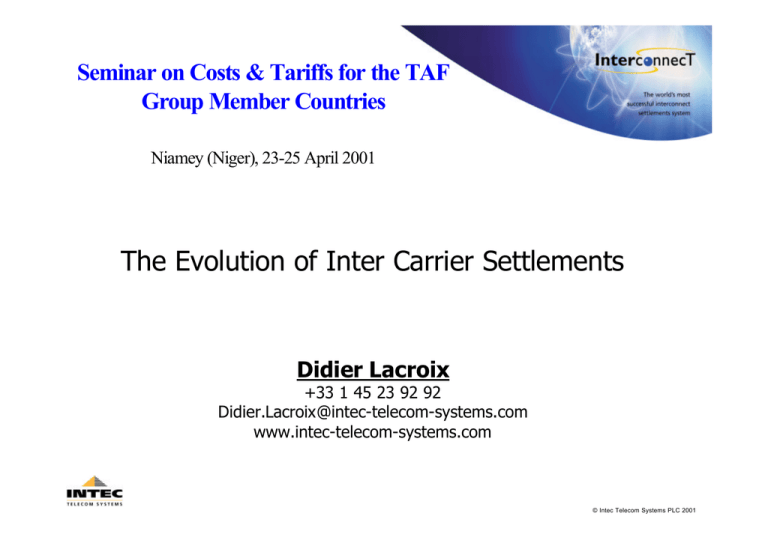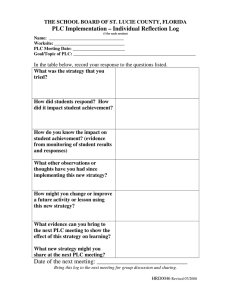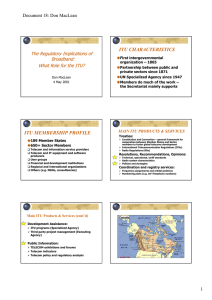The Evolution of Inter Carrier Settlements Group Member Countries Didier Lacroix
advertisement

Seminar on Costs & Tariffs for the TAF Group Member Countries Niamey (Niger), 23-25 April 2001 The Evolution of Inter Carrier Settlements Didier Lacroix +33 1 45 23 92 92 Didier.Lacroix@intec-telecom-systems.com www.intec-telecom-systems.com © Intec Telecom Systems PLC 2001 Agenda u What is Interconnect? u History of Interconnect u Current and Emerging Interconnect Practices u Future of Interconnect (IP/WAP/GPRS/UMTS) u Differences between Retail & Wholesale Billing © Intec Telecom Systems PLC 2001 Definition of Interconnect “Interconnect is the process of handling calls for other operators” ‘The opening of networks to allow the customers of one network operators to communicate with the customers of another’ © Intec Telecom Systems PLC 2001 Why Interconnect is important? Interconnect can represent u the largest single operating cost u the second largest source of revenue “To some operator, interconnect costs represent approximately 30% -50% of their revenues” Computer Computer and and Telecommunications Telecommunications Law Law Review Review April April 1997 1997 © Intec Telecom Systems PLC 2001 History of interconnect u International calls l Between National Incumbent Operators l Rules defined under ITU u Mobile operators l National l International roaming u De-regulation l Mobile l National Long distance and International l Internet l Special services l Fixed local loop © Intec Telecom Systems PLC 2001 ITU InterconnecT Rules u Multilateral agreement l Agreement negotiated within ITU u Prices agreed based on route u Monthly statements u Reconciliation based on Incoming accounts u Dispute resolution process governed by ITU u Quarterly Settlement © Intec Telecom Systems PLC 2001 Types of international interconnect agreements Type of Agreement Geographical area Characteristics Accounting Rate (ITU) Traditionally Worldwide Multi-lateral agreements Used by Incumbent Operators Governed by ITU Migrating to Hubbing Cascade Outside North America Bi-lateral agreements. Wide variation in requirements. Direct Worldwide Multi-lateral agreements between operators participating in the call. Wide variation in requirements. Re-filing, Hubbing Various Offers better rates Illegal in some countries Reseller, Re-origination Various Illegal in some countries For specific destinations © Intec Telecom Systems PLC 2001 ITU Pricing Rules (1) u Traditional ITU Route Based Pricing (TAR) l l International Transit and Terminating Traffic ITU Accounting and Billing u Special deal option for transit traffic u ITU Direct and Cascade Accounting u Operator Assisted Calls u Telex/Telegraph Traffic © Intec Telecom Systems PLC 2001 ITU Pricing Rules (2) u Refile u Hubbing u Re-origination u Voice and Data Traffic Processing u International Special Services l l Freephone Premium rate services © Intec Telecom Systems PLC 2001 De-regulated InterconnecT Rules u Bi-lateral agreement u Prices based on l l bilateral negociations public catalog u Invoicing u Reconciliation based on invoice l seldom standardised u Contractual Dispute resolution process u Settlement based on invoice © Intec Telecom Systems PLC 2001 Types of De-regulated interconnect agreements Type of Agreement Geographical area Characteristics Handshake Sender Keeps All Bill and Keep Various Original form of interconnect agreement Cheap to manage / Does not support transit call Disliked by PTTs / Very scarce now. Revenue Sharing Asia Pacific Based on PTT retail rates Inhibits innovation / Disliked by new entrants Unfair settlement of real traffic Cost Based / Cascade Rest of world outside North America Bi-lateral agreements between operators Wide variation in requirements Access Billing (CABS) Equal Access United States Parts of Asia Pacific Involves widespread use of bureau services to manage agreements Highly standardised IP / Data – QOS Based Revenue Sharing Primarily in Europe Diff from Asian revenue sharing Uses packet, IP, session ID Not usage/time sensitive Distance Based Element Based © Intec Telecom Systems PLC 2001 De-regulated Pricing Rules (1) u Precision Billing (Accurate to Hundredths of a second) u Pulse and Unit Billing u Multiple Currencies (with Euro Support) u Flat Rate u Stepped Rates u Minimum Charge u Zero Duration and Call Attempt Charge u Calculation accuracy down to six decimals © Intec Telecom Systems PLC 2001 De-regulated Pricing Rules (2) u Discounting u Cascade Billing u Direct Billing u Distance or Destination u Element Based Conveyance (EBC) u New products with multiple rating rules u Time Based Pricing versus Content Based Pricing © Intec Telecom Systems PLC 2001 Key Differences u Negotiation process u Rating structure l bi-lateral vs route based u Invoice versus statement u Standardised versus De-regulated reconciliation u Settlement process u Dispute handling within ITU rules © Intec Telecom Systems PLC 2001 International Roaming u Bilateral agreements u Prices l l Retail price + commission Inter Operator Tariff (IOT) u Invoicing u Reconciliation l l l Do Nothing Verification Re-pricing © Intec Telecom Systems PLC 2001 International Roaming (Contd) u Daily exchange of CDRs l TAP files u Settlement l l l Clearing House Net payment Invoice payment © Intec Telecom Systems PLC 2001 IP Interconnection u Complex rating capabilities – new parameters l l l QOS, Session ID Usage based on Bytes, Packets, Hits, Transactions Duration based billing can be irrelevant u Emerging requirements l l l l “not been done before” Will involve more service establishments New pricing models required Value chain revenue sharing u Evolution of business practices l l l Complexity of content going through the roof Cost to deliver falling through the floor Limited opportunity for pure telecom margins © Intec Telecom Systems PLC 2001 Retail versus Interconnect Billing Retail Billing InterconnecT Billing 1. Retail traffic Interconnection traffic 2. Low risk of errors High risk of errors 3. Low rate of dispute High probability of dispute 4. Competitive system “Partner” system 5. Decreasing complexity Increasing complexity © Intec Telecom Systems PLC 2001 1 - Retail vs Interconnection traffic Retail Billing InterconnecT Billing Invoice is the only purpose Invoice and expected incoming invoice Invoice = company image (requires a lot of effort and costs) Invoice must primarily justify interconnection charges Outgoing traffic only Outgoing, incoming and transit traffic needed Single currency Multiple currencies (even on one invoice) Invoice detail by call Invoice detail by summaries Use of A & B number only for rating Use of A, B and network elements for rating Unsuccessful calls are ignored Unsuccessful calls can generated charges Generalised usage of different systems for retail and interconnection billing in the deregulated market and for international settlements © Intec Telecom Systems PLC 2001 2 - Low vs high risk of errors Retail Billing InterconnecT Billing Once database is set up, CDR pricing errors are seldom The constant changes on network, rate, etc lead to errors which need to be corrected to insure revenue No effort neded to insure revenue Constant effort needed to insure revenue Big margin Low margin (revenue sensitive) No need for error management Need for sophisticated error analysis Errors put to trash Errors saved for reprocessing No billing directive set by Legal authority A dedicated Interconnect billing system is often required by the Regulatory Authority or the incumbent operator © Intec Telecom Systems PLC 2001 3 - Low vs High probability of dispute Retail Billing InterconnecT Billing Many customers Few operators Low amount Big amounts Dispute on small amounts Dispute on big amounts (even invoice total) No need to prove good faith but but to print detailed calls or analyse fraud (other system) Need to prove good faith Need for a process to differentiate disputed traffic from agreed one No notion of network elements Network elements are key to differentiate disputed from agreed traffic Call based Reconciliation Sophisticated reconciliation (process based on multiple level summaries) Sophisticated payment tracking Standard payment tracking © Intec Telecom Systems PLC 2001 4 - Competitive vs “partner” system Retail Billing InterconnecT Billing Very often customised True product Bespoke maintenance New releases (new functionality) High implementation costs Low implementation costs High maintenance costs Low maintenance costs High operational costs Low operational costs Competitive advantage “Partnership” with Interconnected operators Closed Open Not designed to be audited Auditable (separate system) © Intec Telecom Systems PLC 2001 5 - Decreasing vs Increasing complexity Retail Billing InterconnecT Billing Trend to simplify offer (time based packages, few rates, few time bands, Complexity due to finding a balance between margin (based on retail offer), cost based logic (enforced by the Authority) and competition Single (and simpler) pricing model Variety of pricing models (time based, content billing, …) Few rate changes Frequent rate changes Marketing driven discounts Volume based discounts Mass marketing Bi-lateral agreements Free market rules Rules defined by the Regulatory Authority © Intec Telecom Systems PLC 2001 Summary u Interconnect is mission critical u Ever evolving u Will change further with IP/WAP/GPRS u There is a need for complete suite of applications u A telco must manage/lower Cost of Ownership u Interconnect is key to Profitability © Intec Telecom Systems PLC 2001


